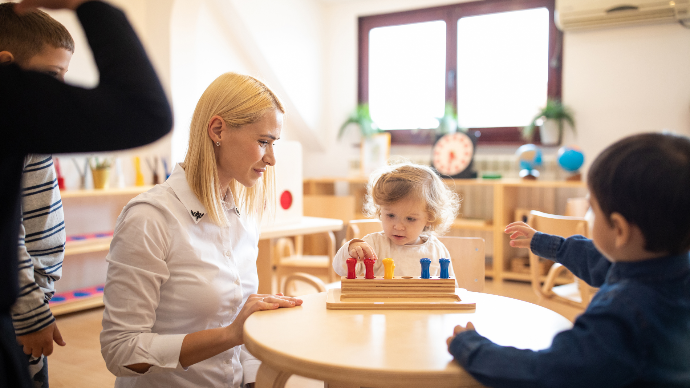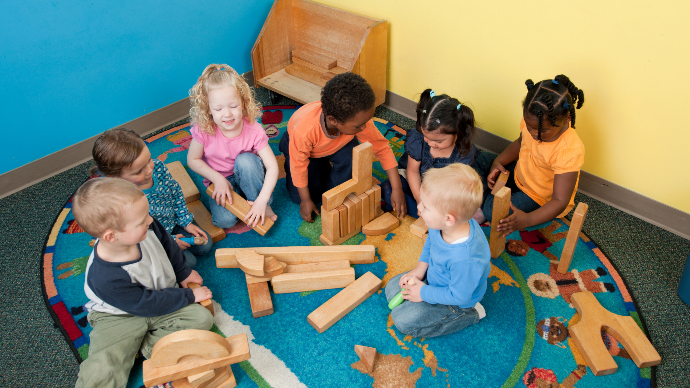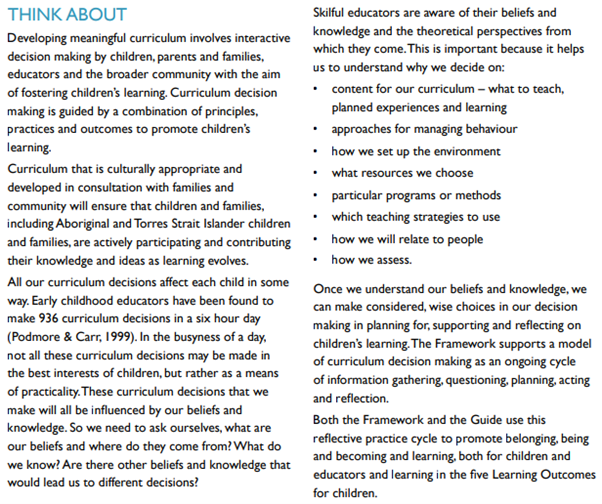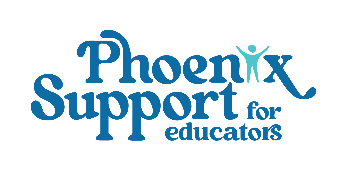Being a member of a few Early Childhood Educator Facebook groups, I often see there is a lot of disagreement among these groups (and throughout the sector) about what being a professional in Early Childhood Education means.
A recent post of mine in an Educator Facebook group was not received well. What was so offensive? I was advocating for a play-based approach to children's learning and wellbeing. Whilst this post was aimed at the benefits of play, many educators in the group felt that I was judging their practice and attacking their opinion on how to work with children.
It can be confusing, frustrating, and often overwhelming to read these comments, or harder still, have conversations with colleagues with whom we have opposing views. We are often confronted with huge differences in opinions and beliefs about what is fact and what you’re ‘supposed’ to do in your job.
So what does professionalism in the Early Childhood Education sector look like?
Sachs (2003) highlights three traditionally understood characteristics of professionalism:
a foundation of expert knowledge, skills and ethics;
practitioner autonomy;
and responsibility by way of sound judgments, ongoing professional development, and ethical and reflective practice.
I recently listened to a podcast by Early Childhood expert and consultant Catharine Hydon about professional identity - what it is and how to develop it, and this further prompted me to share on this topic. It is brilliant and I encourage anyone who is interested in developing their own professional identity to have a listen: https://www.earlyeducationshow.com/episodes/episode102 . You can also read more about professionalism from Catharine Hydon here: http://thespoke.earlychildhoodaustralia.org.au/ethics-professionalism-art-right/
The fact is, there is a plethora of support available to us as educators, and so it is our responsibility to empower ourselves to access the expert knowledge, information, evidence and support that is available to us, so that we can make sense of the practice of others and figure out whether we want to be influenced by it or not.

The ECA Code of Ethics says ...
In relation to the profession, I will
Base my work on research, theories, content knowledge, practice evidence and my understanding of the children and families with whom I work
Take responsibility for articulating my professional values, knowledge, and practice and for the positive contribution our profession makes to society
Engage in critical reflection, ongoing professional learning and support research that builds my knowledge and that of the profession
Work within the scope of my professional role and avoid misrepresentation of my professional competence and qualifications
Encourage qualities and practices of ethical leadership within the profession
Model quality practice and provide constructive feedback and assessment for students as aspiring professionals
Mentor new graduates by supporting their induction into the profession
Advocate for my profession and the provision of quality education and care
Support from mentors and peak bodies also helps us to interpret the National Quality Framework so that we aren't solely influenced by our own bias, beliefs, values and judgements about the way things 'should be' in our work.
The Early Years Learning Framework is based on the best available evidence and what is socially and culturally important. As such, some ideas will be consistent with some of your practices and knowledge, and some will be challenging, new and very particular to Australia. This provides excellent opportunities for all educators to build on their current knowledge and experience, so that their curriculum decision making (both intuitive and reflective judgements) are consistent with current thinking and expectations.
(Educators guide to the Early Years Learning Framework – page 3)
National Quality Framework Resources Kit
We might work in a service where everyone does things a certain way. They believe this is the ONLY way to practice, and can be quick to tell us it's the way to do it, but does that make it right? What if those practices don’t feel right to us? What can we do about it? I know a lot of educators feel powerless in speaking up about the practice of others or the standard in a service. Educators are hesitant to advocate for what they feel is best for children, because they don't feel that they have any backing or support and worry that they could lose their jobs or be excluded by others.
As educators, all we have at a given moment in a given situation is our very best judgement. Throughout our professional lives we study and reflect in order to refine that judgement; we exchange with colleagues, consider others’ solutions to the problems we face, we come together at meetings, we examine the available evidence—all in order to improve our judgement. In the last analysis, our very best judgement is all there is (Katz, 2008).
(Educators guide to the Early Years Learning Framework – page 6)
I recently visited a Certificate III student completing placement in a service. She told me during the visit that the Educators are very strict with children, raise their voice, and give no opportunity for them to engage in risky play - they are always told 'no', 'get down', 'stop doing that.' While visiting the service, I observed children being lined up to go outside. Children were crying, but Educators persisted. The student I was observing had the awareness that these practices didn't feel right and they weren't best for children. She said to me "but what can I do?". The answer is to ensure a lively culture of professional enquiry is fostered within this team. But this is easier said than done.
Over my time in the sector, I’ve felt very uncomfortable when my mentors told me to stop using outdated terms (like childcare, industry) or to stop making children do things for the sake of routine or adult agendas, or to educate myself more on child development and respectful practice. It was hard to be called out because I thought I knew it all and I was running on my beliefs and judgements about how children should behave and what the point of my work was. I still do this and that's the point of critical reflection. Sometimes I thought my mentors were picking on me. They weren't, they were advocating for children's wellbeing, and I'm grateful for their leadership.

Without a guiding curriculum framework, educators’ individual images, beliefs and values about what children should be and what they should become influence both the planned and unplanned curriculum experiences and learning of children and can lead to wide differences in outcomes for children.
Commitment to a shared vision about children’s learning (see pages 5-8 of the Framework) involves:
• questioning why we do things the way we do (our practices)
• reflecting on our practices to make sure that they are consistent with the vision.
(educators guide to the Early Years Learning Framework – page 14)
With any critical reflection question or statement shared amongst educators, it’s a good idea for the person presenting the reflection to offer support and solutions for others to consider. But with that, how willing are we as professionals to consider these solutions and alternatives and make changes in our thinking and practices that are potentially uncomfortable?

(educators guide to the Early Years Learning Framework – page 10)
If you’re feeling a little lost and confused because of the different opinions, practices and standards out there…you are NOT alone! The great news is, there are so many people doing amazing work in the sector. There are so many leaders, incredible educators, and brilliant minds sharing information, tools and resources to help educators align their professional practice with the National Quality Framework and current research towards quality outcomes for children. You just have to look for it and ask the right people for help. Then you need to be brave and practice speaking up for children within your team, try new things, question things that don’t feel right, get familiar with how to report to the regulatory authority and start getting involved with the exciting work that is happening in the sector.
Reflective educators often find it useful to have a ‘critical friend’ to support and challenge their thinking and practice.
A critical friend can:
• inspire, reminding you of the importance of your work and ongoing learning
• provoke, challenging you to explore your beliefs and practices (the why and how you do things in particular ways) with questions, new insights and alternative perspectives
• support, helping you to identify information, resources and processes to expand your inquiry
• provide collegiality, lending you an ear, a shoulder and friendship.
(Educators guide to the Early Years Learning Framework – page 8)
I hope I never stop learning and feeling challenged to improve my practice by the leading forces of support and advocacy in the sector and by looking to the examples of so many excellent educators working in excellent services out there!
This guest blog post was written by Victoria Smeulders. Here's a bit about the author:
Research and reports relevant to the NQF: https://www.acecqa.gov.au/resources/researchPromoting Early Childhood Teacher Professionalism in the Australian Context: the place of resistance
https://researchoutput.csu.edu.au/ws/portalfiles/portal/8778762/PostpubPID22819.pdf
